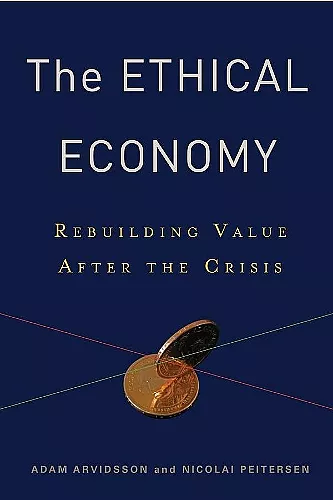The Ethical Economy
Rebuilding Value After the Crisis
Adam Arvidsson author Nicolai Peitersen author
Format:Hardback
Publisher:Columbia University Press
Published:20th Sep '13
Currently unavailable, and unfortunately no date known when it will be back

Today we have a chance to construct instruments, institutions, and infrastructure to reverse the trajectory of a quickly deteriorating economic environment. In this volume, Adam Arvidsson and Nicolai Peitersen show wealth creation can be the result of a new kind of social production, and the motivation of continuous capital accumulation can exist in tandem with a desire to maximize our social impact. They argue that financial markets could become a central arena in which diverse ethical concerns are integrated into tangible economic valuations. Indeed, such a common standard has already emerged, linked to the spread of social media, and Arvidsson and Peitersen recommend how to build upon these developments to initiate a radical democratization of economic systems and the value decisions they generate.
A new, more balanced system of economic production and wealth distribution that fundamentally rethinks the definition of value.A more ethical economic system is now possible, one that rectifies the crisis spots of our current downturn while balancing the injustices of extreme poverty and wealth. Adam Arvidsson and Nicolai Peitersen, a scholar and an entrepreneur, outline the shape such an economy might take, identifying its origins in innovations already existent in our production, valuation, and distribution systems. Much like nineteenth-century entrepreneurs, philosophers, bankers, artisans, and social organizers who planned a course for modern capitalism that was more economically efficient and ethically desirable, we now have a chance to construct new instruments, institutions, and infrastructure to reverse the trajectory of a quickly deteriorating economic environment. Considering a multitude of emerging phenomena, Arvidsson and Peitersen show wealth creation can be the result of a new kind of social production, and the motivation of continuous capital accumulation can exist in tandem with a new desire to maximize our social impact. Arvidsson and Peitersen argue that financial markets could become a central arena in which diverse ethical concerns are integrated into tangible economic valuations. They suggest that such a common standard has already emerged and that this process is linked to the spread of social media, making it possible to capture the sentiment of value to most people. They ultimately recommend how to build upon these developments to initiate a radical democratization of economic systems and the value decisions they generate.
This book offers a thought-provoking combination of ethics and economics to propose a new value regime that will contribute to our understanding of how business can become a force for good in sustainable development. The analysis of the ethics of collaborative work will be useful to practitioners and analysts alike. -- Guido Schmidt-Traub, executive director, Sustainable Development Solutions Network, A Global Initiative for the United Nations Our mainstream economic system has been focusing on a single type of financial capital no longer capable of dealing with the multiple value streams of the emerging contributive and collaborative economy. How to measure, value, and reward contributions is a key question for solving the 'crisis of value,' yet unfortunately, literature and effort are still scarce. This book looks squarely at the value crisis and offers an analysis and proposals for an 'ethical economy.' -- Michel Bauwens, P2P Foundation This book presents a different way to create and distribute wealth. We all want to behave ethically today, but here it is shown how the ethical economy is not just a moral phenomenon. Arvidsson and Peitersen claim that it could and should be the basis for future societies. I personally recommend this book and hope it will not only stimulate positive discussions but also inspire our politicians to make the necessary decisions. -- Niels Jorgen Thogersen, honorary director general, European Commission No topic is more vital than how to rebuild trust in capitalism-yet none is more slippery. Adam Arvidsson and Nicolai Peitersen have done us all a huge favor by thinking it through so thoroughly and above all so realistically. -- Bill Emmot, former editor in chief, The Economist They are harbingers of a new paradigm Journal of Markets and Morality
ISBN: 9780231152648
Dimensions: unknown
Weight: unknown
208 pages